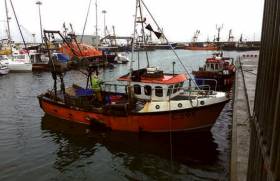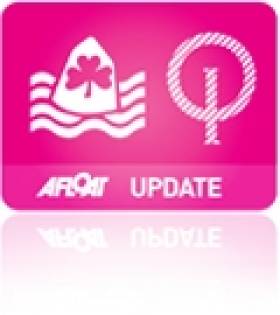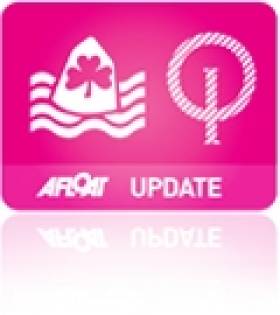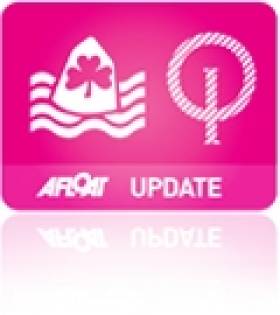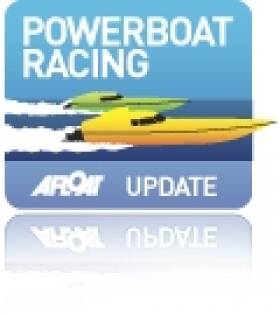Displaying items by tag: Napier
Watch Your Bilge Spaces, Fishing Boat Operators Warned
#Fishing - The latest Marine Notice from the Department of Transport, Tourism and Sport reminds fishing vessel operators to monitor their bilge spaces prior, during and after voyages.
It is also essential that bilge alarms are tested regularly, to determine that both the audible and visible alarms are working.
In addition, it is good practice to regularly inspect bilge suction strainers to ensure they are clean and ready for use.
The notice is prompted by the recommendation made in last year's report by the Marine Casualty Investigation Board into the sinking of the FV Napier off the Saltee Islands on 30 January 2014.
As previously reported on Afloat.ie, the Kilmore Quay lifeboat launched to the rescue of two fishermen on board the small lobster boat as it sank off the Co Wexford islands.
The official MCIB report into the incident was unable to determine the exact cause of water flooding the boat's bilge and engine area as it was not recovered from the sea bed, though it is presumed to be a serious failure of the seawater cooling system.
Sophie Takes a Break as Optimists Go Team Racing
#optiworldsnz – After three days of individual racing the focus changed at the OptiWorlds today with the first day of team racing seeing 40 national teams sail in warm sun and light airs but for Ireland's Sophie Browne, the sole Irish competitor in Napier, it is time for a break from racing, she is next back on the water on Saturday for race seven.
"Each team has four sailors so some countries were excluded from today's racing" according to Pete Dawson Chairman of OptiWorldsNZ.
Team racing allows sailors to enjoy the short tactical duels, each team sails at least two races. Then the losing team is knocked out of the competition. When not racing, the sailors are rafted up and eating with their team mates, often from other countries.
There was also a strong contingent of shore based supporters including their national flags as the sailing took place within 100 meters of the beach with commentaries provided and ice creams close at hand.
At the end of the first days' racing a heat between China and Spain remains to be sailed with the following teams progressing through to the second days racing: USA, Peru, Malaysia, Sweden, Norway, Brazil, Croatia, Singapore, Thailand, the Netherlands, Portugal, Denmark, Argentina and Poland. Tomorrow's racing will see 16 teams contest the competition, with New Zealand knocked out of the competition by Spain today.
"Team racing is all about tactics with the aim to ensure that your whole team (4 boats) incurring the lowest number of points" says Mr Dawson. "Each race is a knock out duel with the losing team being eliminated from the competition".
As a consequence it makes an ideal spectacle for the public to enjoy as the races are of a short duration and the results are immediate. There is even a race score board on the beach for the public to see who is winning and with cool drinks and ice creams close at hand, who can resist?
Racing conditions for tomorrow are predicting another warm day with northwest breezes. Racing starts at 10.00am. Friday is a Lay Day and the individual racing continues with race 7 on Saturday.
The provisional leader board (for the individual racing) shows: 1 Ryan Lo (SIN) 14 points, 2 Bart Lambriex (NED) 23 points, 3 Javier Arribas (PER) 25 points, 4 Wade Waddell (USA) 32 points, 5 Leonard Takahashi-Fry (NZL) 33 points, 6 Peter Lin Janezic (SLO) 40 points, 7 Philip Meijer (NED) 41 points, 8 Ahmad Syukri Abdul Aziz (MAS) 41, 9 William Marshall (USA) 44 points, 10 Miel Verstraete (BEL) 44 points.
Sophie Drops to 16th After Six Races in New Zealand
#optiworldsnz –Sailing for Ireland, Sophie Browne of Tralee Bay Sailing Club has dropped from 7th to 16th overall after six races sailed at the Optimist World Championships, according to provisional results from organisers this morning. Browne scored a 16th in race six of the 210–boat fleet to place 16th overall. Significantly though the top Irish sallor is on equal points with 14th place and only seven points off the top ten, still very much in contention. Only 10 points separate 11 of the top 16 boats in the fleet with a further discard in hand and everything to play for. It is the first time Ireland has contested the World championships in four years, Irish efforts have been previously concentrated on the European championships.
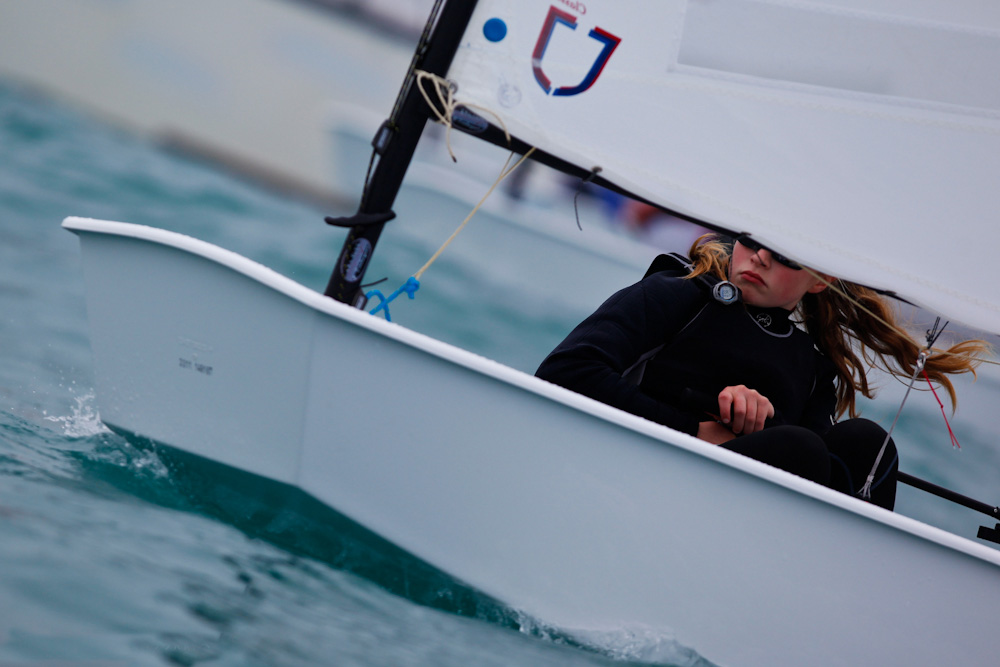
Sophie on day three of the Oppy worlds in Napier. Photo: Matias Cappizzano
Today, the third day of racing at the Optimist World Championships, the breeze was light and variable and when the race officer got proceedings underway it was 5 to 7 knots of wind. Although the conditions did not suit Sophie very much, she has still managed to maintain a consistent performance on a very challenging day for her.
The usual local wind pattern has not materialised in the past few days and the temperature has been lower than usual with rain and cloud cover. The land has not heated up enough to generate sufficient convection to establish a sea breeze.
The wind shifted and dropped making conditions very difficult at times. Sophie had been in 7th place overall on the leader board overnight after 2 days of the event, but despite a difficult start she managed to claw her way back to 12th place at the winward mark and held on to her place to the wing mark, she then improved and gained a few more places on the last beat to the finish line when the wind dropped off further before shifting and favouring the opposite side of the track.
Sophie finished 16th in the only race today and now lies 16th overall for the championship after one discard.
She continues to sail with consistency which may assist her in the overall standings at the end of the regatta. She has placed in the top 20, out of 210 boats competing, in every one of her 6 races so far in this event.
The next two days are for team racing only followed by a lay day and Sophie's next race will be on Saturday when the last 3 days of fleet racing starts.
More results as we have them. Day two vid below where Sophie gets vertiable mention for her strong wind technique.
Seventh Overall, Browne Stays in Contention at Optimist World Champs
#OPTI – Ireland's Sophie Browne stayed on course for a top result at the Optimist World championship in New Zealand yesterday counting four more top 20 results in the 210–boat feet to be plced seventh overall after five races sailed.
The young sailors race in six groups so even after five races there are still a lot of ties and uncertainties but there is no doubting the performance of Browne so far.
Her father Donal who travelled with her to New Zeland sent us this message this morning:
"Sophie is going very well and she is keeping very cool, conservative, playing it straight up the fairway, playing the percentages and trying to control some of the very serious oposition. It is early days in a long regatta and its just another day at the office! Sophie is really enjoying the kiwi experience here in Napier"
The sole Irish competitor is now on equal points with sixth overall. The Tralee Bay sailor counts a very consistent set of scores of 4,12, 17, 5 and 14, and only 29 points off first place on the nation leaderboard currently held by Holland's Bart Lambriex.
You could hear a sigh of relief when all 210 competitors got up this morning: the sun was out, and there was a bit of a breeze. During the day, the wind changed and the clouds came back in, but at least the rain held off.
The race committee decided early on to try and get four races completed today in order to catch up with yesterday's delays and abandonment of the second race.
First race started at 10.25am with only 6 knots breeze. Later in the day, the wind got up to 20 knots, but was not staying around for long. A few of the flights had to be abandoned, but overall the race committee is pleased to have called four races for each of the three fleets.
Provisional results after five races show Bart Lambriex from the Netherlands placed first, Wade Waddell from the USA is placed second and Philip Meijer also from the Netherlands is placed third.
Ryan Lo who was in second place yesterday, holds the fourth position.
Best New Zealand sailor is Leonard Takahasi-Fry, who is now in sixth position, climbing from 23rd yesterday.
It was a long but very good day for sailing. Sailors left the harbour at 9.30am to start the first race at 10.25am and returned around 5pm.
The weather for tomorrow is promising to be fine with southerlies dying out, with wind speed around 12 knots. The lighter winds are usually favourable for the lighter sailors, and this competition isn't over yet. The Optimist World Championship finishes on January 9th.
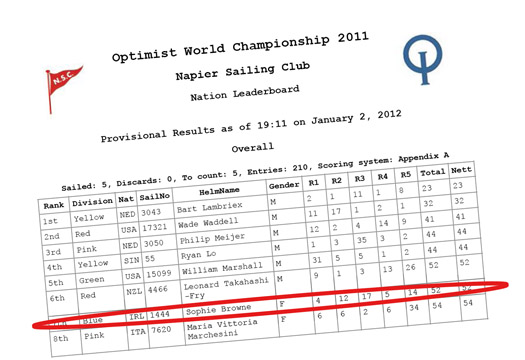
All our coverage of Sophie Browne at the Optimist World Champs here
Powerboat Racing's 'America's Cup' Returns to Cork
Plans are afoot to bring powerboat racing's Harmsworth Trophy event to Cork in 2014 - over 100 years since Cork Harbour hosted the first ever edition of the race. SCROLL DOWN FOR ARCHIVE Footage.
Regarded as the powerboat version of yachting's America's Cup, the first Harmsworth Trophy was won in July 1903 by Napier, which was allegedly piloted by women's world land speed record holder Dorothy Lewitt.
According to the Tom MacSweeney column in the Evening Echo, a consortium is hard at work to bring the race back to its birthplace - coinciding with the Round Ireland Powerboat Race, which will also be held out of Cork in 2014.
Denis Dillon of the Irish Sailing Association commented: "There is a group of Cork enthusiasts interested and is trying to put a consortium together that would also bring back one of the original 1903 boats still is existance which is in the USA.
"It came first in its class and second overall in the race in 1903 and they hope to bring it back for the 2014 race."



























